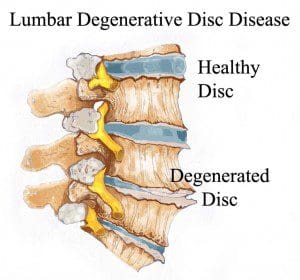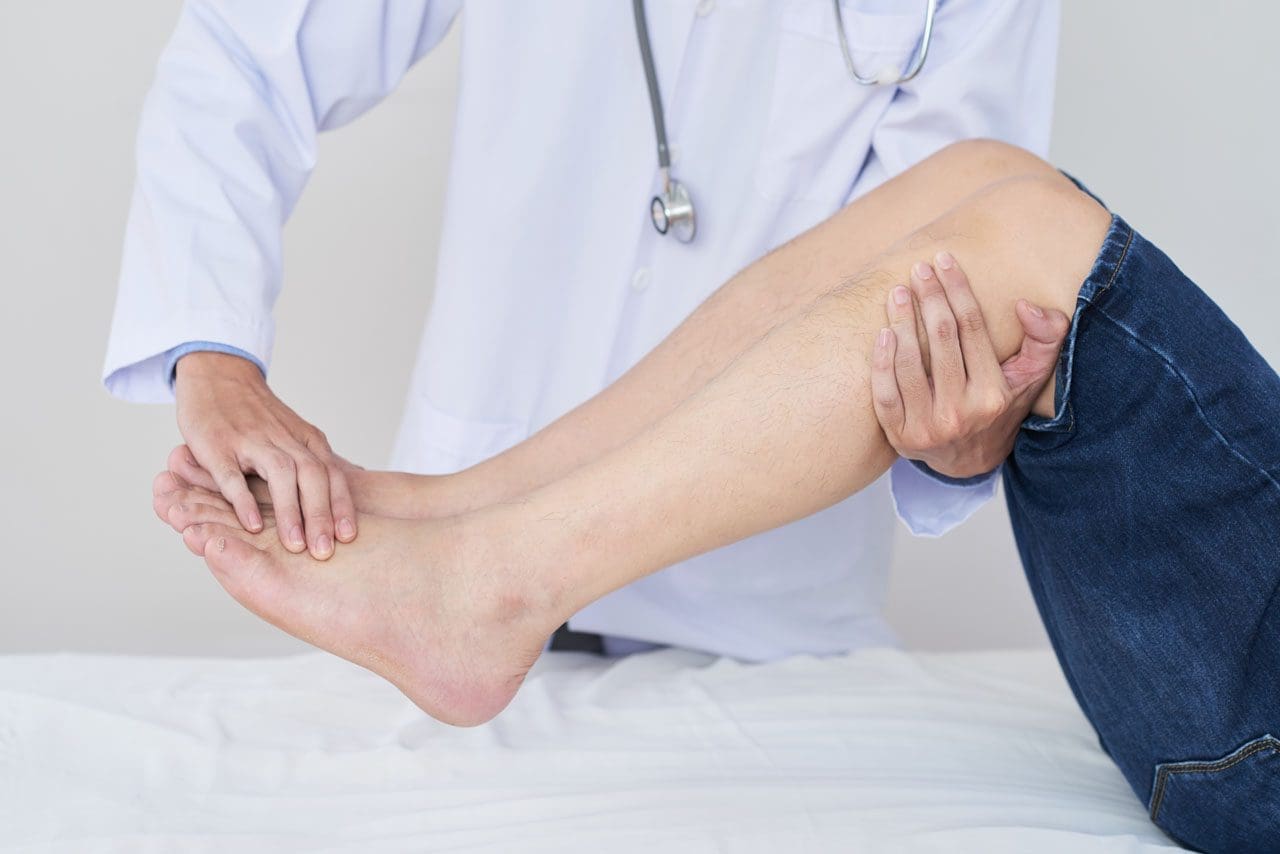Q: Dr. Jimenez, I have a question about degenerative disc disease, and that is, can it cause nerve pain in the feet? El Paso, TX.
A: Yes, in certain cases, degenerative disc disease (DDD) can cause nerve problems with the feet.
Degenerative disc disease, specifically of the lower spine, can cause nerve pain to radiate and spread into the feet from the spine.
Table of Contents
Degenerative disc disease
It is a spine condition caused by everyday wear and tear and can lead to significant loss of disc height.

A disc can also herniate and push on the nerves that flow into the feet and cause:
- Pain
- Tingling
- Numbness
The wear and tear of the spine combined with a herniated disc can pinch the nerves that go to the feet.
There is a condition known as foraminal spinal stenosis when the spinal foramen, or the small opening between the spine’s bones, begins to narrow and tighten, so the nerves get compressed. They do not allow signals and chemicals to flow properly.
This could explain the pain or other symptoms in the foot.
DDD can cause nerve problems in the feet and back, and chronic back pain is the most common symptom of degenerative disc disease.
Common degenerative disc disease symptoms
The pain increases when:
- Sit down for a long time
- Bending
- Lifting
- Twisting
The pain decreases with the following:
- Walking
- Running
- Lying down
- Continually changing body positions
It’s important to remember that spinal conditions do not always cause nerve issues with the feet; this could include
- Infections like discitis
- Injuries like a spinal fracture

Treatment
Depending on how severe the nerve problem is, there are several treatment options. These range from:
- Chiropractic care
- Physical therapy
- Over-the-counter medication
Talk to a doctor or a chiropractor about the right treatment option for foot nerve pain, whether it is caused by degenerative disc disease or some other condition.
Does degenerative disc disease go away
Degenerative disc disease symptoms can be managed by making small lifestyle changes.
Healthy diet
Begin with:
- Fruits
- Vegetables
- Whole grains
- Fish
- Lean meats
- Beans
- Healthy fats like fish and olive oil
These can help maintain a healthy weight, as being overweight puts extra pressure on the spine, which leads to increased back pain. Consult with a registered dietitian or health coach to discuss the best foods for your diet.
Exercise
- A training regimen that incorporates aerobic, strength, and flexibility exercises that can help manage degenerative disc symptoms.
- A personal trainer or sports chiropractor that has experience rehabilitating patients with spine conditions. They can teach exercises that can help relieve pain and other symptoms.
Physical/Chiropractic
Chiropractic or physical therapy can offer stretches and exercises to improve:
- Strength
- Flexibility
- Range of motion
- They can develop a custom physical therapy program
Regular chiropractic and physical therapy can help restore proper body mechanics and proper posture and avoid positions that cause pain.
Surgery
Surgery is considered a last resort if the condition progresses and worsens. If surgery is needed, your doctor will discuss the best treatment option for your condition.
Difference Custom *FOOT ORTHOTICS* Make to Control Posture & Mobility El Paso, TX.
NCBI Resources
Chiropractic focuses on restoring and maintaining overall health and wellness. A chiropractor can re-align the spine and improve a patient’s strength, mobility, and flexibility through spinal adjustments and manual manipulations.
Post Disclaimer
Professional Scope of Practice *
The information on this blog site is not intended to replace a one-on-one relationship with a qualified healthcare professional or licensed physician and is not medical advice. We encourage you to make healthcare decisions based on your research and partnership with a qualified healthcare professional.
Blog Information & Scope Discussions
Welcome to El Paso's Premier Wellness and Injury Care Clinic & Wellness Blog, where Dr. Alex Jimenez, DC, FNP-C, a board-certified Family Practice Nurse Practitioner (FNP-BC) and Chiropractor (DC), presents insights on how our team is dedicated to holistic healing and personalized care. Our practice aligns with evidence-based treatment protocols inspired by integrative medicine principles, similar to those found on this site and our family practice-based chiromed.com site, focusing on restoring health naturally for patients of all ages.
Our areas of chiropractic practice include Wellness & Nutrition, Chronic Pain, Personal Injury, Auto Accident Care, Work Injuries, Back Injury, Low Back Pain, Neck Pain, Migraine Headaches, Sports Injuries, Severe Sciatica, Scoliosis, Complex Herniated Discs, Fibromyalgia, Chronic Pain, Complex Injuries, Stress Management, Functional Medicine Treatments, and in-scope care protocols.
Our information scope is limited to chiropractic, musculoskeletal, physical medicine, wellness, contributing etiological viscerosomatic disturbances within clinical presentations, associated somato-visceral reflex clinical dynamics, subluxation complexes, sensitive health issues, and functional medicine articles, topics, and discussions.
We provide and present clinical collaboration with specialists from various disciplines. Each specialist is governed by their professional scope of practice and their jurisdiction of licensure. We use functional health & wellness protocols to treat and support care for the injuries or disorders of the musculoskeletal system.
Our videos, posts, topics, subjects, and insights cover clinical matters and issues that relate to and directly or indirectly support our clinical scope of practice.*
Our office has made a reasonable effort to provide supportive citations and has identified relevant research studies that support our posts. We provide copies of supporting research studies available to regulatory boards and the public upon request.
We understand that we cover matters that require an additional explanation of how they may assist in a particular care plan or treatment protocol; therefore, to discuss the subject matter above further, please feel free to ask Dr. Alex Jimenez, DC, APRN, FNP-BC, or contact us at 915-850-0900.
We are here to help you and your family.
Blessings
Dr. Alex Jimenez DC, MSACP, APRN, FNP-BC*, CCST, IFMCP, CFMP, ATN
email: coach@elpasofunctionalmedicine.com
Licensed as a Doctor of Chiropractic (DC) in Texas & New Mexico*
Texas DC License # TX5807
New Mexico DC License # NM-DC2182
Licensed as a Registered Nurse (RN*) in Texas & Multistate
Texas RN License # 1191402
ANCC FNP-BC: Board Certified Nurse Practitioner*
Compact Status: Multi-State License: Authorized to Practice in 40 States*
Graduate with Honors: ICHS: MSN-FNP (Family Nurse Practitioner Program)
Degree Granted. Master's in Family Practice MSN Diploma (Cum Laude)
Dr. Alex Jimenez, DC, APRN, FNP-BC*, CFMP, IFMCP, ATN, CCST
My Digital Business Card


